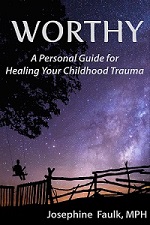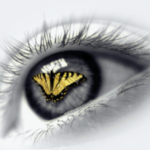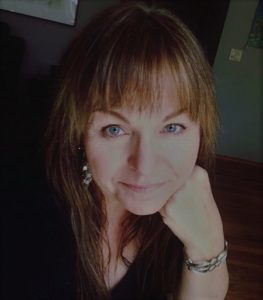The Forgiveness Myth
by Josephine Faulk, MPH · Published · Updated
When someone attempts to force forgiveness onto a person who has suffered deeply at the hands of another, they are audaciously assuming the role of a god. The only person You have any obligation whatsoever to forgive is . . . yourself. To think otherwise is to proclaim yourself a god with a thorough understanding of all the details of the other person’s life and an omnipotent wisdom and vision of how all relationships and karma work out over lifetimes. So, assuming you don’t fit that bill let’s just talk about You forgiving You.
As a survivor of chronic childhood trauma you probably often find yourself in either ‘blame everybody but yourself’ mode or, at the other end of the spectrum, in ‘I am the most miserable excuse for a person I know’ mode.
This is called black and white thinking. It’s unrealistic as it distills all the details of whatever is upsetting you into a single variable; you’re either completely right or you’re completely wrong. This type of thinking becomes an obstacle to being calm and centered and is one of the biggest barriers to recovery. The cure?
Clarity and the True Self
Gaining clarity is one of the preeminent goals of recovery. With clarity comes understanding and a newfound accountability for our present and prior actions, which can result in unwarranted feelings of guilt and shame. As we heal old wounds and advance into the realm of reasonableness we begin to view our relationships and our own past and present behaviors in those relationships, in a whole new light. It is not always the most flattering light either.
There will be cringing involved, coupled with a tight feeling in the chest and the predilection to take on all the blame, which is neither healthy nor helpful. As you awaken to your True Self you will need to sometimes gently reassure yourself that in the past you did the best you could with what you had to work with.
“I did then what I knew how to do. Now that I know better, I do better.” Maya Angelou
Remember, you are now parent to yourself as beloved child. “Now I know better, I do better” has become my favorite self-soothing mantra. Repeat until whatever shame or guilt is assailing you passes. And stay present, which is the only place you can forgive and encourage yourself.
Begin now with WORTHY A Personal Guide for Healing Your Childhood Trauma and its companion Workbook. I’ll be there to hold your hand, every step of the way.
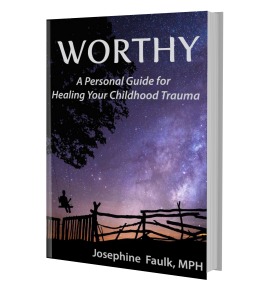
Available at Amazon > Worthy: A Personal Guide for Healing Your Childhood Trauma
Before you go, I want to invite you to join our Worthy Community. By signing up (the form is in the sidebar) you will receive:
* Chapter One of my book WORTHY A Personal Guide for Healing Your Childhood Trauma immediately
* Personal delivery of my entire Monday blog post weekly
You can find and subscribe to me spreading the love at:
https://www.instagram.com/worthyasweare/
Portland, Ore., USA — Ms. Faulk’s academic training, her own lifelong struggle with the repercussions of childhood trauma and her inspiring recovery have coalesced in WORTHY A Personal Guide for Healing Your Childhood Trauma (274 pages) and its accompanying workbook, WORTHY A Personal Guide for Healing Your Childhood Trauma WORKBOOK (110 pages.)
In Worthy author, Josephine Faulk, MPH personally guides readers through The Childhood Trauma Recovery for Adults Program. In Part I readers come to understand that they are not broken, defective, nor unworthy of love, especially self-love. They are, instead, harboring one or more of their wounded child selves sequestered deep within their heart and mind. They learn the eleven commonalities of adults haunted by the effects of childhood trauma and how and why it continues to manifest in their adult lives. A chapter on brain chemistry explains the mystery of triggers, isolationist behavior and the tendency to dissociate as a self-preservation mechanism. They learn why their every romantic relationship continues to reflect the negative dynamics of their most challenging parental relationship and how to resolve that permanently. Here they gather hope, knowledge and the first thin layers of clarity.
In Part II readers receive detailed instruction on how to choose a trauma therapist, use of tools, techniques and practices that have long proven their immense value in healing psychological, emotional and spiritual trauma wounding. This is where The Childhood Trauma Recovery for Adults Program is laid out in detail. The author leaves no room for failure as she instructs, informs and encourages readers in a warm, kind, yet determined manner.
Here Ms. Faulk shares insights into her personal recovery story. Her challenges and triumphs leading to self-acceptance and unconditional love of self are a well-laid blueprint to guide readers to an understanding of their own inherent worthiness.
Part III is a plan for lifetime maintenance of readers newly acquired recovery. Its purpose is to preserve, sustain and protect all present and future recovery progress. Here readers are taught how to lovingly parent themselves. They learn ways to think that increase their internal structure of support for when they experience life’s inevitable uncertainties. Life may still be a roller coaster at times, but with this knowledge and these techniques readers will at least be securely buckled in.
Contact Information
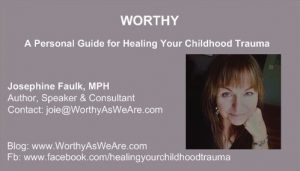 I am available for public speaking engagements. Please email me for available dates and locations.
I am available for public speaking engagements. Please email me for available dates and locations.
Author: Josephine Faulk, MPH Contact:joie@worthyasweare.com Website: www.WorthyAsWeAre.com https://worthyasweare.com/press-kit/ https://www.facebook.com/healingyourchildhoodtrauma/
See Promotional Photos Below

